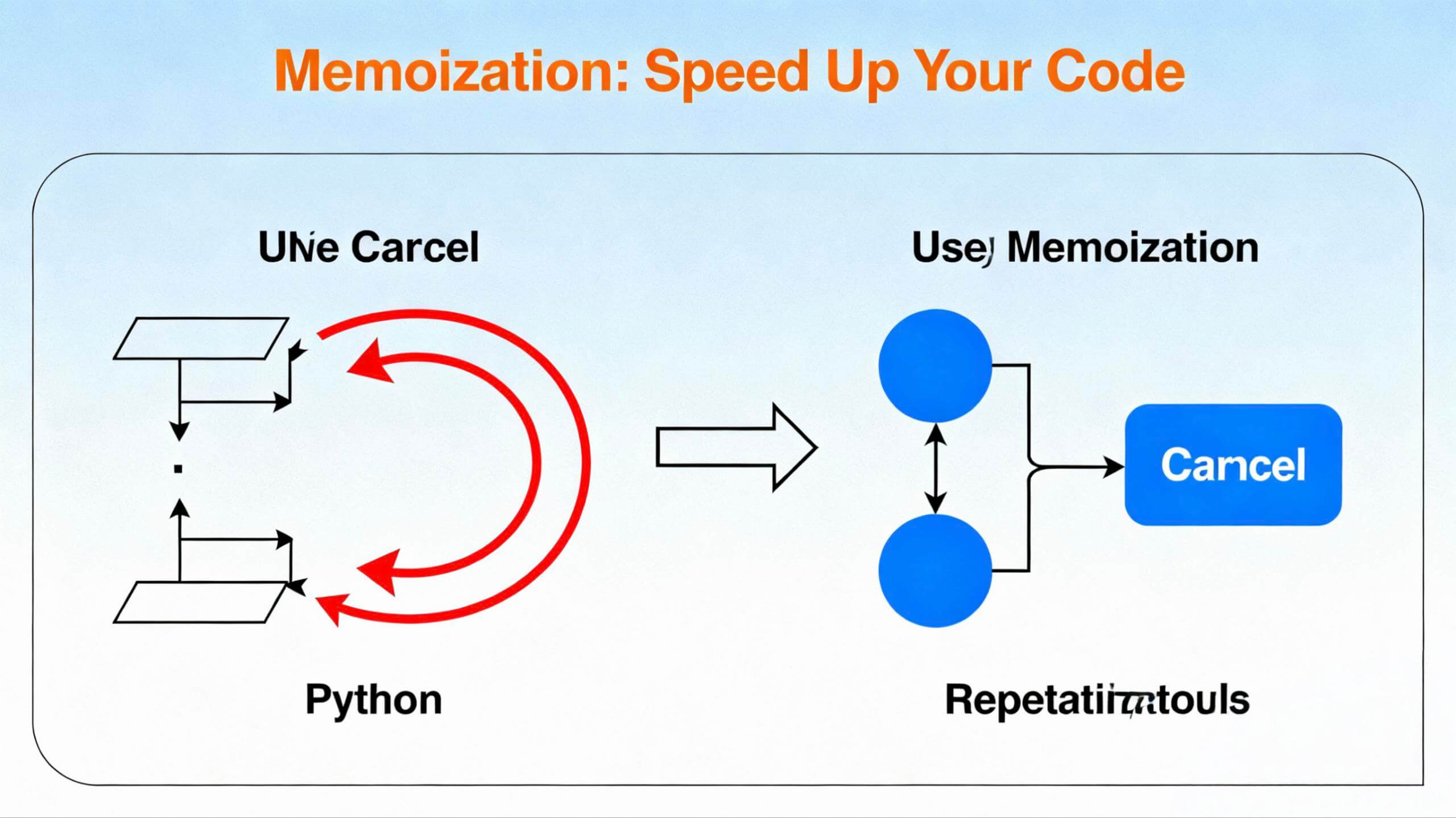备忘录化
在计算机科学中,备忘录化是一种优化方法,通过缓存耗时函数调用的结果,并在相同输入再次出现时重用这些存储的结果,从而加速程序。
Python 的 functools.lru_cache 和 functools.cache
简单轻量级的无限制函数缓存。有时称为“备忘录化”。
返回与 lru_cache(maxsize=None) 相同的结果,为函数参数的字典查找创建一个薄包装。因为它不需要驱逐旧值,所以它比有大小限制的 lru_cache() 更小且更快。
例如:
@cachedef factorial(n):
return n * factorial(n-1) if n else 1
>>> factorial(10) # 没有之前缓存的结果,进行11次递归调用
3628800
>>> factorial(5) # 只是查找缓存值的结果
120
>>> factorial(12) # 进行两个新的递归调用,其他10个是缓存的
479001600
缓存是线程安全的,因此包装的函数可以在多个线程中使用。这意味着在并发更新期间,底层数据结构将保持一致。
最近几年我见过哪些被重复使用的地方?
避免重复加载昂贵的yaml文件
@cache
def get_glossary_data():
return load_yaml_file("nomenclature/glossary.yml")
在本地化的 i18n 目录等内容上实现一些 Multiton 模式
@cache
def get(locale: str, *, domain: str) -> Translations:
... # 许多繁重的工作 return Translations(...)
@cache
def compile_query(expression: str) -> ParsedResult:
return jmespath.compile(expression)
从另一个域扩展对象
@cache
def load_settings(entity_id: str) -> Settings:
return SettingsFactory(entity_id).load_settings()
也许在代码源中还有其他使用方法?
需要注意的事项、应避免的事项以及需要思考的事项
🌞 当它是一个纯函数时
from lib.i18n import get_locale
@cache
def get_heavy_stuff():
for _ in range(0, 1_000**2):
...
return "funny"
没什么好说的。直接使用它 😎
🚨 当实现使用上下文内容时例如
from lib.i18n import get_locale
@cache
def get_that_thing(text):
locale = get_locale() # ⛔️🚨🚔👮🏽📢
return TheHeavyThing(text, locale=locale)在这个例子中,locale 是一个隐藏参数。重构:
from lib.i18n import DEFAULT_LOCALE
@cache
def get_that_thing(text, locale: str = DEFAULT_LOCALE): # 👼🌴🌞
return TheHeavyThing(text, locale=locale)🐒 修改常量的猴子补丁
🐒🌴🥥
# lib.some.thing
MAGIC_VALUE = 42
@cache
def get_that_power():
return MAGIC_VALUE ** 2
def am_i_strong_enough(me):return get_that_power() < me
# tests.lib.some.thing_testfrom lib.some.thing_test import get_that_power
def test_get_that_number_1(monkeypatch):
monkeypatch.setattr("lib.some.thing.MAGIC_VALUE", 1) # 🌴🥥
assert get_that_power() == 1
...
def test_am_i_strong_enough():
assert am_i_strong_enough(10) is False # 🫨😨🫨😨
尽量避免修补常量,这会给你带来麻烦。🫨
通过重构代码,你应该能够应对。
😰 使用 @cache 装饰方法
class DumbestCalculatorEver:
@cache
def double(self, x): return x * 2
DumbestCalculatorEver() # 永远不会被垃圾回收
DumbestCalculatorEver() # 永远不会被垃圾回收
DumbestCalculatorEver() # 永远不会被垃圾回收
不要或明智地使用 单例模式。因为对象将变得永生,可能导致内存泄漏。
🤔 天真地缓存实体属性
@cache
def is_settings_metasyntactical(settings: Settings) -> bool:return settings.search("foo || bar || baz || `false`")
settings1 = Settings({"id": "xxx", "foo": True})
settings2 = Settings({"id": "xxx", "bar": False})
settings3 = Settings({"id": "xxx", "baz": True})
assert is_settings_metasyntactical(settings1) is True # ???
assert is_settings_metasyntactical(settings2) is False # ???
assert is_settings_metasyntactical(settings3) is True # ???
assert hash(settings1) == hash(settings2) == hash(settings3) # 真实情况
这导致测试变得不稳定,也可能在生产环境中引发错误。
处理实体属性案例的一些想法
给定这个函数
@cache
def is_settings_metasyntactical(settings: Settings) -> bool:
return settings.search("foo || bar || baz || `false`")我们期望这个函数的行为类似于一个设置属性,这将等同于:
class Settings:
@property
def is_metasyntactical(self):
return self.search("foo || bar || baz || `false`")偶然情况下,设置配置在脚本解析期间被更改的可能性很小。此外,缓存的设置在脚本/调用结束时始终会被清除。
处理这种情况有几种方法:
想法 1:始终在脚本/查询结束时清除此缓存
try:
return resolve_the_query()
finally:
is_settings_metasyntactical.clear_cache想法 2:让实体注册外部属性?例如:
class Settings:
cache = {}
def is_settings_metasyntactical(settings: Settings) -> bool:
cache_key = is_settings_metasyntactical
try:
result = settings.cache[cache_key]
except KeyError:
result = settings.cache[cache_key] = settings.search("foo || bar || baz || `false`")
return result
因为我们总是在脚本/调用结束时清除设置,因此缓存的数据将与实体实例一起被销毁。
想法 3:使用 weakref 使用外部缓存
weakref 模块允许 Python 程序员创建对对象的弱引用。
对一个对象的弱引用不足以使该对象保持存活:当对一个引用的唯一剩余引用是弱引用时,垃圾回收 可以自由地销毁该引用并将其内存重新用于其他用途。
from weakref import WeakKeyDictionary
_cache = WeakKeyDictionary()
def is_settings_metasyntactical(settings: Settings) -> bool:
try:result = _cache[settings]
except KeyError:
result = _cache[settings] = settings.search("foo || bar || baz || `false`")
return result我们依赖Python在垃圾回收期间清理缓存。


